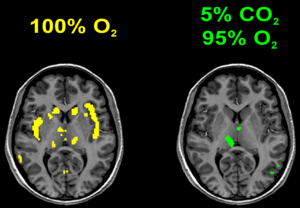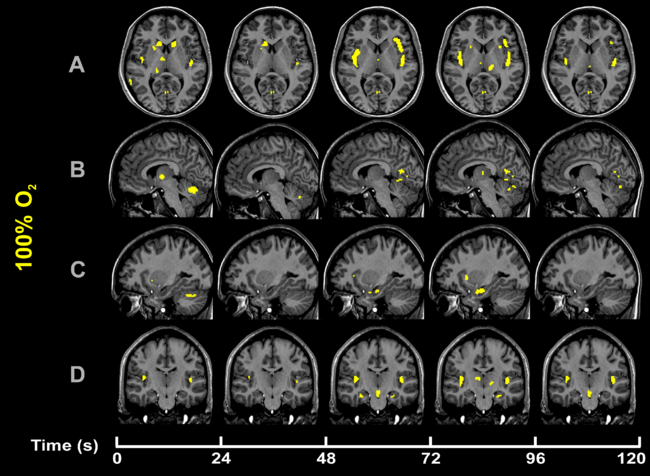Hyperoxia: Difference between revisions
Jump to navigation
Jump to search



imported>Daniel Mietchen (+image) |
imported>Daniel Mietchen (image legend) |
||
| Line 3: | Line 3: | ||
{{Image|CO2-O2-fMRI-A-left.png|left|300px|[[fMRI|Functional magnetic resonance imaging]] of the [[human brain]] during gas challenges. Instead of normal air, the participants inhaled either pure [[oxygen]] (hyperoxia condition), or 95% oxygen and 5% [[carbon dioxide]] ([[hypercapnia|hypercapnic]] hyperoxia). Yellow (hyperoxia) and green (hypercapnic hyperoxia) overlays of regions of significant signal response in 14 children at any of five time successive periods during the challenges. Multiple brain regions responded to hyperoxia, but the addition of 5% O<sub>2</sub> by CO<sub>2</sub> greatly reduced most responses.}} | {{Image|CO2-O2-fMRI-A-left.png|left|300px|[[fMRI|Functional magnetic resonance imaging]] of the [[human brain]] during gas challenges. Instead of normal air, the participants inhaled either pure [[oxygen]] (hyperoxia condition), or 95% oxygen and 5% [[carbon dioxide]] ([[hypercapnia|hypercapnic]] hyperoxia). Yellow (hyperoxia) and green (hypercapnic hyperoxia) overlays of regions of significant signal response in 14 children at any of five time successive periods during the challenges. Multiple brain regions responded to hyperoxia, but the addition of 5% O<sub>2</sub> by CO<sub>2</sub> greatly reduced most responses.}} | ||
{{Image|CO2-O2-fMRI-hyperoxia-over-time.png|right|650px|The same information, now plotted at five successive time periods during the challenges (time scale below images)}} | {{Image|CO2-O2-fMRI-hyperoxia-over-time.png|right|650px|The same information for the hyperoxic condition, now plotted at five successive time periods during the challenges (time scale below images)}} | ||
Revision as of 16:14, 27 May 2010
Hyperoxia [r]: An increased partial pressure of oxygen in the blood. [e]
This article contains just a definition and optionally other subpages (such as a list of related articles), but no metadata. Create the metadata page if you want to expand this into a full article.

(CC) Image: Macey et al., 2007
Functional magnetic resonance imaging of the human brain during gas challenges. Instead of normal air, the participants inhaled either pure oxygen (hyperoxia condition), or 95% oxygen and 5% carbon dioxide (hypercapnic hyperoxia). Yellow (hyperoxia) and green (hypercapnic hyperoxia) overlays of regions of significant signal response in 14 children at any of five time successive periods during the challenges. Multiple brain regions responded to hyperoxia, but the addition of 5% O2 by CO2 greatly reduced most responses.
Functional magnetic resonance imaging of the human brain during gas challenges. Instead of normal air, the participants inhaled either pure oxygen (hyperoxia condition), or 95% oxygen and 5% carbon dioxide (hypercapnic hyperoxia). Yellow (hyperoxia) and green (hypercapnic hyperoxia) overlays of regions of significant signal response in 14 children at any of five time successive periods during the challenges. Multiple brain regions responded to hyperoxia, but the addition of 5% O2 by CO2 greatly reduced most responses.

(CC) Image: Macey et al., 2007
The same information for the hyperoxic condition, now plotted at five successive time periods during the challenges (time scale below images)
The same information for the hyperoxic condition, now plotted at five successive time periods during the challenges (time scale below images)